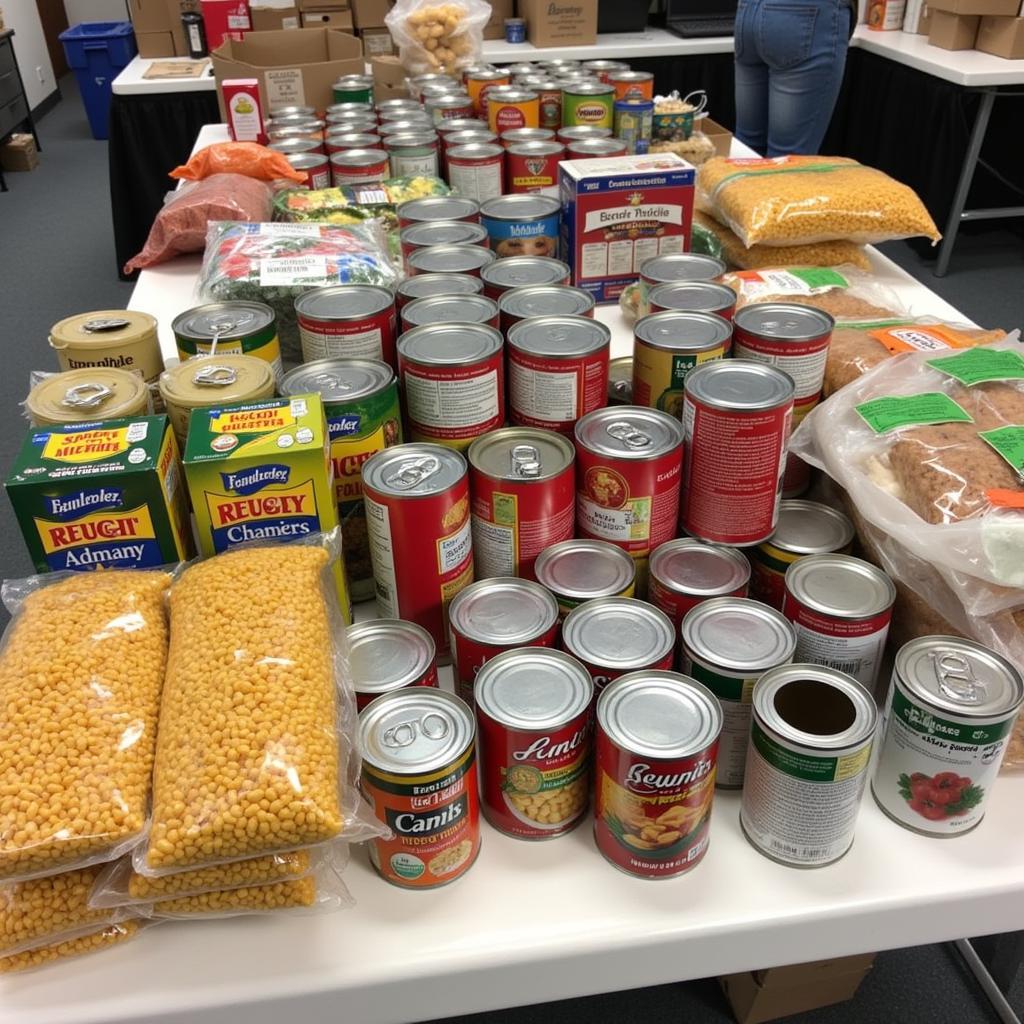Providing Bulk Food For Homeless individuals and families is a vital act of compassion and a practical way to address hunger in our communities. When we think of the homeless population, access to regular, nutritious meals isn’t always a guarantee. This is where the importance of bulk food donations comes into play. But how can you ensure your contributions are truly helpful and respectful of the dignity of those in need? This guide will explore the different facets of donating bulk food to those experiencing homelessness, ensuring your efforts have the greatest impact.
Understanding the Need for Bulk Food for the Homeless
Homelessness is a complex issue with a multitude of contributing factors, but the need for consistent access to food remains a constant. Many individuals and families facing homelessness rely on the generosity of food banks and shelters for their daily meals. These organizations, in turn, depend heavily on bulk food donations to meet the high demand.
By providing bulk food, you directly contribute to:
- Alleviating hunger: Your donations help ensure that people experiencing homelessness don’t have to go hungry, providing them with much-needed sustenance.
- Supporting shelters and food banks: Bulk donations allow these organizations to allocate their resources more effectively, focusing on other crucial services like housing assistance and job training.
- Promoting health and well-being: Access to nutritious food is essential for maintaining physical and mental health, which is particularly crucial for individuals facing the challenges of homelessness.
Choosing the Right Bulk Food for Donation
 Assortment of healthy non-perishable food items ready for donation
Assortment of healthy non-perishable food items ready for donation
While the gesture of giving is always appreciated, it’s essential to consider the practicality and suitability of your bulk food donations. Here’s what to keep in mind:
Non-perishable Items:
- Canned Goods: Canned fruits, vegetables, beans, soups, and tuna are excellent sources of nutrients and have a long shelf life.
- Grains and Pasta: Rice, quinoa, oatmeal, and pasta are affordable, versatile staples that can be used in various meals.
- Nut Butters: Peanut butter, almond butter, and other nut butters are packed with protein and healthy fats.
- Shelf-Stable Milk and Plant-Based Alternatives: These provide essential calcium and vitamin D.
- Cereal: Choose whole-grain options that are lower in sugar.
Other Essential Items:
- Cooking Oil: A small bottle of oil can go a long way in preparing meals.
- Spices and Seasonings: Salt, pepper, and other basic seasonings can add flavor to otherwise bland meals.
- Personal Hygiene Products: Soap, shampoo, toothpaste, and toothbrushes are essential for maintaining hygiene.
“When gathering bulk food for donation, it’s crucial to prioritize items that are nutritious, easy to prepare, and have a long shelf life. Think about what you would appreciate if you were in their position,” advises Sarah Thompson, Director of Outreach at the Community Food Share. “Remember, food is more than just sustenance; it’s about dignity and offering nourishment for both body and soul.”
Making Your Donation Count: Best Practices
- Contact Local Shelters and Food Banks: Reach out to organizations in your area to inquire about their specific needs and donation guidelines.
- Check Expiration Dates: Ensure all donated items are well within their expiration dates.
- Consider Dietary Restrictions: When possible, choose items that cater to common dietary restrictions, such as gluten-free or vegetarian options.
- Organize a Food Drive: Engage your community by hosting a food drive to collect bulk donations.
- Volunteer Your Time: Offer to help sort and distribute food at a local shelter or food bank.
Conclusion
Donating bulk food for homeless individuals and families is a meaningful way to address a critical issue in our society. By choosing appropriate items and partnering with local organizations, you can ensure your contributions make a tangible difference in the lives of those who need it most. Remember, even small acts of kindness can have a ripple effect, fostering a community of compassion and support for those experiencing homelessness.
FAQs
1. What are the best non-perishable food items to donate to the homeless?
Some ideal non-perishable items include canned goods (fruits, vegetables, beans, soups), grains and pasta, nut butters, shelf-stable milk or plant-based alternatives, and cereal.
2. Can I donate clothes or blankets along with food?
Yes, many shelters and organizations accept clothing and blanket donations. It’s best to check with the specific organization about their current needs and guidelines.
3. How can I find a local food bank or shelter that accepts bulk donations?
You can search online for “food banks near me” or “homeless shelters near me.” Websites like Feeding America and the National Alliance to End Homelessness also offer resources to find local organizations.
4. Is it better to donate food or money to help the homeless?
Both food and monetary donations are valuable. Food donations provide immediate sustenance, while monetary donations offer flexibility for organizations to purchase items they need most.
5. How can I get my community involved in donating bulk food to the homeless?
Organizing a food drive is an excellent way to engage your community. You can also spread awareness through social media, local newsletters, or by partnering with schools or businesses.
Need Help? Contact Us!
For any assistance with your donation or if you have any further questions, please don’t hesitate to reach out to us.
Phone Number: 02437655121
Email: minacones@gmail.com
Address: 3PGH+8R9, ĐT70A, thôn Trung, Bắc Từ Liêm, Hà Nội, Việt Nam.
Our dedicated customer support team is available 24/7 to assist you.